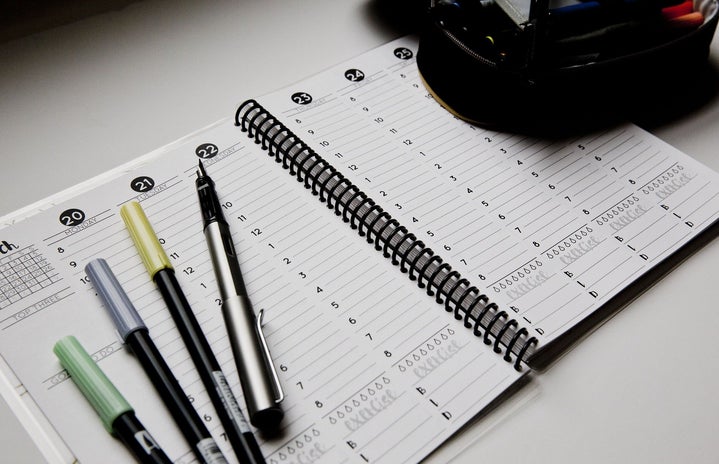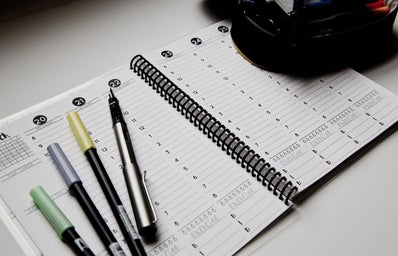Chances are you are online and stumbled upon this article in another attempt to put off studying. Lucky for you, this is probably one of the most productive ways you could be procrastinating. So brace yourself and get ready to…
1. Write, Don’t Type!You may have heard some of your professors, in their desperate attempts to deter students from scrolling through facebook, drone on about how writing your notes is actually more effective. In fact, they were right. You may have memorized where every letter on the keyboard is and be able to type without looking- but in the case of studying, that does you no favors. The act of physically writing out each letter, compared to blindly typing, helps to solidify the words into a form of concrete memory.
2. Pick the right pen:Perhaps you have a lucky pen or your trusty ‘found this at the bottom of bag don’t know how it got there’ pen, but investing in pens that feel comfortable to write with makes all the difference. Additionally, the colour pen you choose to write with can make a difference as well. Writing in blue ink helps your memory retain information.Another trick to try is writing with different coloured pens. Using a variety of colours to write headings, bullet points and key words is a great way to visually break up information. It can also serve as a mental break, if you change colours every chapter then your brain will associate it with beginning a new task, and feel refreshed.3. Quite Social Media Cold Turkey:If you find yourself consistently on less then academic sites (other than Her Campus, obviously), then it’s time to call in reinforcements. There are a ton of websites and apps that block you from using social media and unproductive websites. Using sites like cold turkey allow you to choose the sites you want blocked, for how long, and will help you stop using them cold turkey.
4. Make a Playlist:If you are the type of studier who prefers to listen to music make a playlist. Either find a go-to 8 tracks playlist or make your own on iTunes. By having a playlist at the ready, it will help minimize the distracting task of finding the next song to play. If you make your own, try to make it a for significant amount of time. That way it will serve the dual purpose of a timer, and you’ll know (when it ends) you’ve studied for over an hour.Also add a couple of fun songs you really love or can’t help but dance to, that way whenever they come on you can take a spontaneous 3 minute break.
5. Map it out:Creating a mind map, especially if you think of yourself as a visual learner, is a good study technique to try. It can help your brain to make connections between different ideas and will help you recall the most important information. It also improves the flow of your ideas and it’s another way to use your colorful pens (milk that investment!). It also gives you a break from linear note taking, which can be repetitive and make it harder to find links between different sets of information.
6. Make information relevant:This tip may sounds simple, but it’s not to be overlooked. The majority of the time we fail to remember information, because it doesn’t seem significant to us. Try finding ways to relate personally to the information, or write your notes using language you actually use (not 100% copied from the textbook) so that the information will seem more familiar and less foreign. Try making an acronym for related chunks of information. If you can’t the find the perfect one, the extra time you spent trying to make one will make the information more relevant and standout in your memory.
7. Take a break, don’t procrastinate: We’ve all been there. You’ve been sitting at a desk staring at the same page for what feels like ages and are contemplating how much longer you have to sit there before you can pull up netflix. In reality you haven’t been as productive as you need to be and the harsh reality of is that exams are coming no matter how productive you’ve been. How do you increase your productivity? Well the answer may surprise you- take a break.Working for too long on a task can actually decrease your productivity. So set mini goals for yourself. For every 30 minutes you study take a 5-10 minute break, for every hour take a 10-15 minute break. Don’t try to read an entire 40 page chapter in one sitting, after every 10 pages take 5 minutes for yourself. Check your texts (because you definitely weren’t doing that while you were studying, right?), get a snack, talk to your roommate, or watch one youtube video.Most importantly, pulling an all nighters may sometimes me absolutely necessary; however, whenever you feel yourself getting too tired to retain information stop. Sleep is an important memory aid that people often disregard and an equally important component to successful studying. After all, you don’t want all your hard work to be foiled because you feel asleep around question 21.
8. Practice safe breath:Strangely enough, the smell or flavour of peppermint can have beneficial effects on your cognitive functions. It can help you with problem solving, reasoning and even memory. In high school, I had a teacher who would give mints with every test she handed out. She even suggested we studied with a mint-that way the familiarity of the habit might provoke us to remember something we studied.So try studying with a piece of gum or mint in your mouth, and bring along an extra one for the exam! If you don’t feel like it’s minty-ness positively influenced your memory, at least you know it positively influenced your breath.
9. Study ahead of time:This tip may seem obvious and sound cliché, but only is for one reason- it works. Studying smaller increments of time over a longer period of time is overall more effective than cramming a few days prior to an exam (or the night before, if we’re being honest with ourselves). Why? It the information more time to move from your short term to long term memory. Try planning ahead by working backwards. Write down all the dates you have exams so you can see when you are busiest and when you have more time to study. Then, working backwards, try to schedule time to study starting two weeks before your exam. Even studying for 30 minutes every night (or second night), two weeks before your exam, and then switching to longer periods the week before will make all the difference. The information will become more familiar and you will have left yourself a couple of review days to go back and study the parts that were the most unfamiliar to you.
10. Test yourself:Be honest, do you actually use the online websites that come with your textbooks or the practice questions your prof assigns? Most of the online components to certain textbooks offer online quizzes. Closing your notes and textbook to test yourself is a great way to see how much of the information you are retaining. If it turns out you don’t remember that much, that’s still great. By repeatedly testing yourself and comparing your answer with the correct one, it will help solidify the answer in your memory…and it’s better to know what you don’t know before you sit down to write the real exam!If you haven’t been provided with any practice questions then check your textbook, or make up you own by rewriting some facts into questions.
Bonus tip: Get in the habit of rewarding yourself after you’ve written an exam. Right after writing your exam, go grab your favorite latte or meal, watch that episode you’ve been putting off, or hangout with your friends. It’ll be something to look forward to and motivate you to get through studying and writing the exam!
Now, close this window and get comfortable because…


